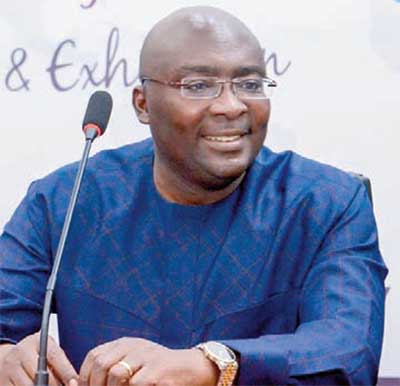Vice-President Dr. Mahamudu Bawumia
After forward and backward bashings from members of the opposition National Democratic Congress (NDC) on the depreciation of the cedi, the Vice-President Dr. Mahamudu Bawumia has hit back, educating the NDC on the state of the economy.
Giving a picture of the economy, the vice-president said though the cedi had depreciated in recent times, the economic fundamentals and indices are proofs that the Ghanaian economy is in a relatively good shape as compared to previous years.
He said unlike the days of the erstwhile Mahama administration where the depreciation of the cedi was way out of control and speeding as though on a carbon highway, under the Akufo-Addo government, the economic indicators are firm and strong; hence the growth of the economy.
The vice-president made this known during the launch of the National School Entrepreneurship Initiative in Tamale in the Northern Region.
Stating what has caused the depreciation of the cedi to the dollar, Dr. Bawumia explained that interest rates of the dollar had been increased by the Federal Reserve of America, causing the dollar to appreciate, hence the depreciation of the cedi and other currencies around the globe.
“Even India, a very strong and vibrant economy, has had its currency depreciated to the dollar,” Dr. Bawumia pointed out.
He disclosed that the cedi had depreciated by 7 per cent – the second lowest depreciation of the cedi since 2012.
Comparing the data from 2012 to 2018, he said the cedi recorded 17.5% in 2012, 14.6% in 2013, 31.3% in 2014, 15.6% in 2015, 9.6% in 2016 and 4.9% in 2017.
During his days in opposition, Dr Bawumia affirmed that “if the fundamentals of the economy are weak, the exchange rate will expose you.”
According to him, the growth of the economy even under unfavourable conditions has been possible because of its prudent management, with strong fiscal discipline.
He stated: “Government has put in place measures to transform the economy to provide good climates for the growth of businesses, especially in the private sector. Such measures include the cancellation of some 15 taxes, which has significantly boosted trade and businesses in the country, especially importations. For the first time in the history of Ghana, GDP growths have seen an increase in non-oil products.”
The vice-president said the debt to GDP ratio has declined to 64 per cent as of 2018 – the first of its kind since 2007.
“. . . and the difference between the NDC and the NPP is this – while the NPP is borrowing, debt to GDP is falling, but the opposite is always the case with the NDC,” the vice-president revealed.
FROM Eric Kombat, Tamale

